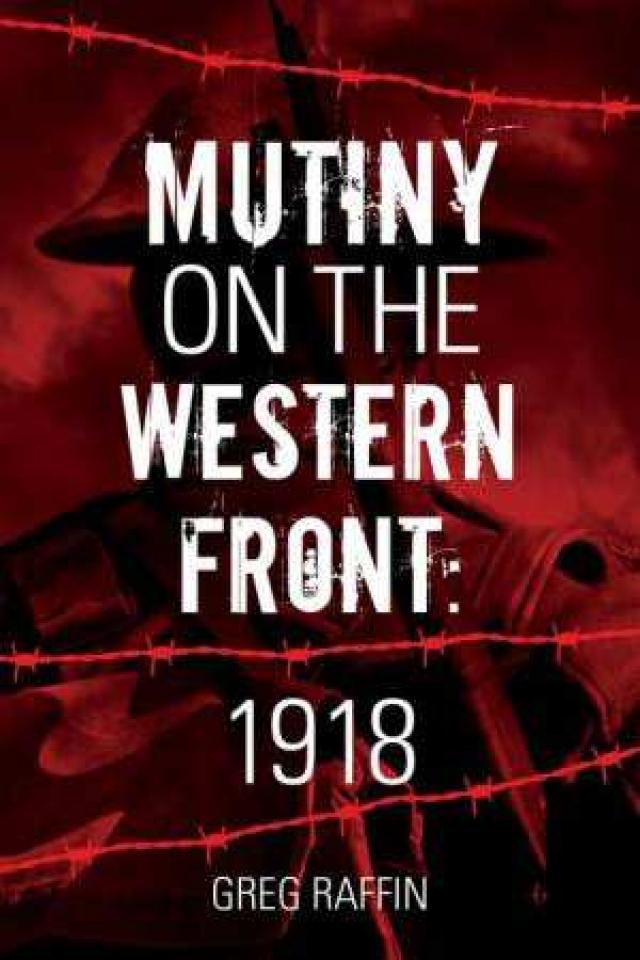This book was released in September 2018 to coincide with the 100th anniversary of the mutiny.

Paperback 284pp RRP: $29.99
Greg Raffin is a retired history teacher and the author of Australia’s Real Baptism of Fire which is an account of the Australian takeover of German possessions in New Guinea during the First World War.
At about 3pm on 19th September 1918 men of the 1st Battalion of the AIF who had been fighting in the front line for many days were relieved and sent a short distance to the rear to rest. At some time on the afternoon of the following day they were told that their rest period had been cancelled and were ordered to return to the front. In what was the largest instance of mass ‘combat refusal’ in the AIF’s history 119 men, including a number of NCO’s, defied the order and moved further to the rear. The men were court martialed in October 1918. Most were found not guilty of mutiny but guilty of desertion (possibly this was to avoid the application of the death penalty – the penalty for mutiny) and sentenced to jail. Privates were sentenced to three years penal servitude while NCO’s were reduced to the ranks and sentenced to between five-and-ten years penal servitude. Eleven of those charged were found not guilty of either mutiny or desertion because the prosecution could find no evidence that those particular men had been ordered back into the line.
Unfortunately, it is not until over half-way through the book that the author gives us an account of the mutiny and its aftermath and presents a summary of views on the nature and causes of the mutiny. The most interesting material in the first half of the book is to be found in Chapter 4 titled ‘Military Training and Discipline’. The author draws on the remarkable writings of Charles McMoran Wilson (and in particular his book An Anatomy of Courage) on how men react to battle stress, particularly that due to fatigue, monotony and the death of comrades.
In his discussion of the ‘mutiny’ in the second half of the book, the author shows that the men involved were not told clearly why they were being ordered back to the Front, nor were they told exactly what it was they were expected to do when they go there or how long they would likely be in action.
Raffin is of the view that had there been clearer communication of orders and one of his more junior officers to ask the men to write out their grievances for him to read, having read more proactive and effective leadership it is highly likely that the mutiny would not have occurred. Indeed, in one of the most interesting parts of the book (chapter 10) he contrasts the events of 20th September involving the 1st Battalion, where only junior officers interacted with the men, with Brigadier General ‘Pompey’ Elliot’s handling of a very similar instance of ‘combat refusal’ involving men of the 59th battalion on 5th September. On hearing of their refusal Elliot sent them he then went himself to speak with the men who, after being given time to re-consider their actions, agreed to rejoin their battalion.
As we proceed through the book we follow the life and military experiences of one of the men, Rollo Taplin who had anonymously expressed his views in the award-winning documentary Mutiny on the Western Front first shown in 1979. Mainly because of this ‘personal dimension’ it is impossible for the reader not to empathize with the men involved.
The book includes fourteen B&W photographs together with two very helpful maps. It also has eight pages of very useful Appendices mostly about command structures, commanders, and battles in France in which the Australian Corps was involved) but also including a table showing the number of death sentences and executions for each country involved in the First World War.
(Interestingly 121 Australian soldiers were sentence to death but none were executed while 28 New Zealanders were sentenced to death and five were executed.) There are nine pages of endnotes, a bibliography and an index which unfortunately is limited to people’s surnames.
Reviewed for RUSI by Robert Dixon, April 2019
Contact Royal United Services Institute about this article.






